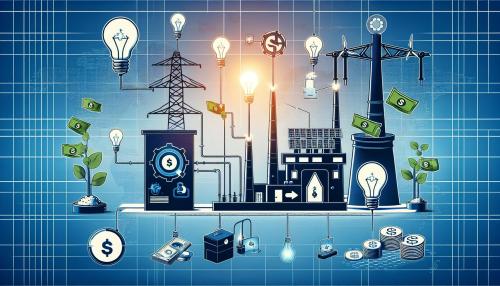Revolutionizing the Energy Sector: The Dawn of Microgrids

In the modern era, the energy industry is embarking on a revolutionary journey. This industry that was once dominated by fossil fuels is now witnessing a significant shift towards renewable sources, with governments worldwide increasingly focusing on decarbonizing their economies. Leading this charge is the revolutionary technology of microgrids.
Microgrids are localized grids that can disconnect from the traditional grid to operate autonomously. In essence, they help balance supply and demand and ensure a steady supply of power, even in the face of more frequent and severe weather-related disruptions.
Microgrids offer a prospective solution to the intermittency problem plaguing renewable energy sources such as solar and wind. Since these energy sources don't generate power consistently - the sun doesn't always shine, and the wind doesn't always blow - they need to be integrated with stable energy sources or storage solutions. This is where microgrids come in.
The ability of microgrids to function independently of the main grid makes them particularly valuable in disaster scenarios. If a severe storm or other emergency cuts off the traditional power supply, microgrids can continue to provide electricity. This offers not only a valuable safety net for communities but also supports a more sustainable energy future.
Further, the rise of decentralized energy production has made microgrids feasible. With the technology available for homes and businesses to generate their own electricity, power need not be something that is delivered from a big, centralized plant miles away.
However, the wide-scale deployment of microgrids presents several challenges. These include technical issues related to grid stability, regulatory and policy hurdles, and the significant capital costs involved. Yet the potential benefits - enhanced resilience, energy cost savings, and reduced carbon emissions - are increasingly making microgrids a vital part of our energy future.
In conclusion, as the energy industry grapples with the twin challenges of decarbonization and digitalization, it's becoming more evident that the future of energy is diverse, decentralized, and digital. And microgrids will play a critical role in this future, offering the potential not only to increase resilience and reduce emissions but also to democratize and decentralize the energy system.
Microgrids are localized grids that can disconnect from the traditional grid to operate autonomously. In essence, they help balance supply and demand and ensure a steady supply of power, even in the face of more frequent and severe weather-related disruptions.
Microgrids offer a prospective solution to the intermittency problem plaguing renewable energy sources such as solar and wind. Since these energy sources don't generate power consistently - the sun doesn't always shine, and the wind doesn't always blow - they need to be integrated with stable energy sources or storage solutions. This is where microgrids come in.
The ability of microgrids to function independently of the main grid makes them particularly valuable in disaster scenarios. If a severe storm or other emergency cuts off the traditional power supply, microgrids can continue to provide electricity. This offers not only a valuable safety net for communities but also supports a more sustainable energy future.
Further, the rise of decentralized energy production has made microgrids feasible. With the technology available for homes and businesses to generate their own electricity, power need not be something that is delivered from a big, centralized plant miles away.
However, the wide-scale deployment of microgrids presents several challenges. These include technical issues related to grid stability, regulatory and policy hurdles, and the significant capital costs involved. Yet the potential benefits - enhanced resilience, energy cost savings, and reduced carbon emissions - are increasingly making microgrids a vital part of our energy future.
In conclusion, as the energy industry grapples with the twin challenges of decarbonization and digitalization, it's becoming more evident that the future of energy is diverse, decentralized, and digital. And microgrids will play a critical role in this future, offering the potential not only to increase resilience and reduce emissions but also to democratize and decentralize the energy system.